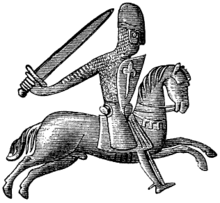Birger Brosa
Birger Brosa († January 9, 1202 on Visingsö ) was a Swedish Jarl (Duke) from 1174 to 1202 and had a French lily as her coat of arms.
Brosa means the smiling one , but this epithet is only known in the western Nordic sources of the 13th and 14th centuries. In the 1180s it was known as dux sveorum .
In his time he was the most powerful man in Östergötland and, in addition to the ancestral seat in Bjälbo, owned several farms in Östergötland, Närke and Värmland. It is assumed that he also had farms in Södermanland (Sörmland), as he had the right of patronage over the Sankt Eskils church in Sörmland. Birger Brosa was a great patron of the Riseberga monastery .
According to Hermann von Wartberg's Chronicon Livoniae , Birger Brosa wanted to undertake a crusade to Livonia around 1195 , but his ship was driven off to Estonia . After looting the land for three days, the Estonians agreed to pay tribute and convert to Christianity. After accepting the tribute, Birger returned to Sweden.
He appears to have been a personality with access to significant power resources who managed to keep Sweden for a long period of peace. Power feuds broke out immediately after his death in 1202.
Birger Brosa was the son of Bengt Snivil and married Birgitta Haraldsdotter Gille before 1170 .
progeny
- Filip Birgersson , Jarl of the Norwegian King Sverre († 1200)
- Knut Birgersson , Jarl of Sweden, († January 31, 1208 in the Battle of Lena)
- Folke Birgersson († July 17, 1210 in the Battle of Gestilren )
- Magnus
- Ingegerd Birgersdotter, Swedish queen, married to Sverker II.
- Kristina Birgersdotter
- Margareta Birgersdotter
filming
In 2008 the director Peter Flinth filmed the Götaland trilogy by Jan Guillou under the title Arn - The Crusader . Birger Brosa was portrayed by Stellan Skarsgård .
Individual evidence
- ↑ Dominik Waßenhoven: Scandinavians on the move in Europe (1000–1250): Studies on mobility and cultural transfer on a prosopographical basis . Akademie-Verlag, Berlin 2006, ISBN 3-05-004285-0 , pp. 165 .
| personal data | |
|---|---|
| SURNAME | Birger Brosa |
| BRIEF DESCRIPTION | Swedish Jarl (Duke) |
| DATE OF BIRTH | 12th Century |
| DATE OF DEATH | January 9, 1202 |
| Place of death | Visingsö |

